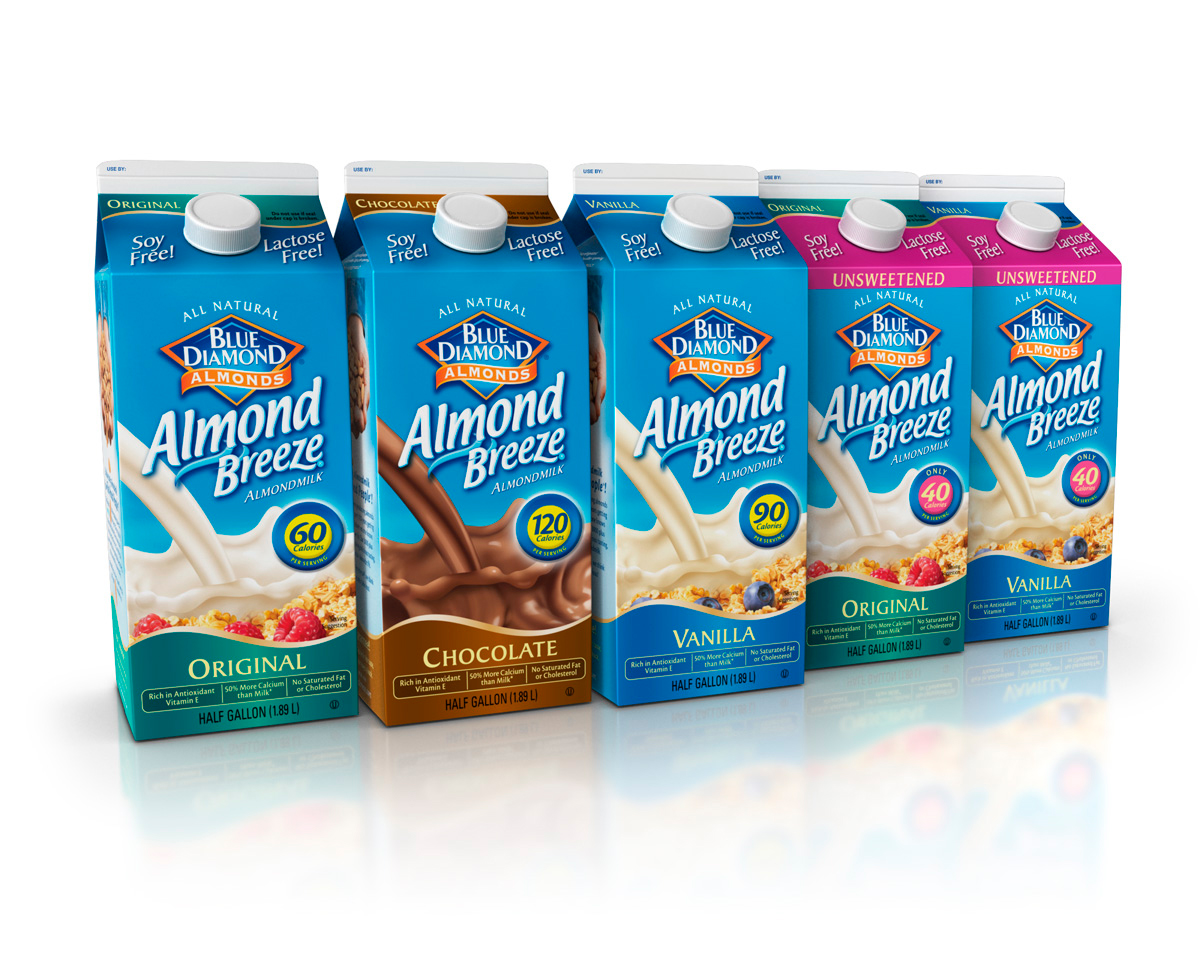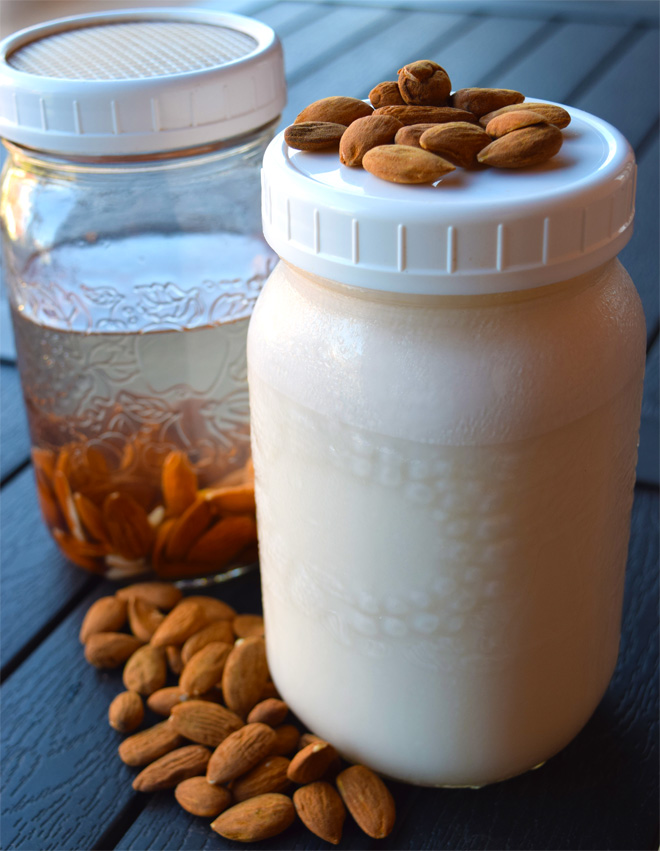Commercially sold almond milks, as found at your local health store, are full of synthetic chemicals that stress your immune system and contribute to chronic disease. Read on to find out why you should only drink real home-made almond milk.
Synthetic Ingredients:
 Here are just some of the harmful ingredients you will find listed on your store-bought “almond milk” carton:
Here are just some of the harmful ingredients you will find listed on your store-bought “almond milk” carton:
Vitamin A Palmitate – This is a synthetic version of vitamin A that is associated with birth defects and bone fractures while providing zero health benefits. Other side effects of this isolated chemical form of vitamin A include tumor enhancement, joint disorders, osteoporosis, extreme dryness of eyes, mouth and skin, enlargement of liver and spleen, irritability, drowsiness, fatigue, insomnia, abdominal pain, blurred vision, headache, hair loss, muscle pain with weakness, menstrual abnormalities, seizures, nausea, and immune suppression.
Furthermore, vitamin toxicity, known as hyper-vitaminosis, commonly results from consuming too much synthetic “purified” vitamin A and not from naturally occurring vitamin A (from real food sources). A study published in the American Journal of Clinical Nutrition reports that “the acute and chronic effects of vitamin A toxicity are well documented in the literature. Emerging evidence suggests that subtoxicity without clinical signs of toxicity may be a growing concern, because intake from preformed sources of vitamin A often exceeds the recommended dietary allowances (RDA) for adults, especially in developed countries [emphasis is mine]”.1 Still haven’t thrown out your store-bought “almond milk”?
Vitamin D2 – This synthetic form of vitamin D needs to be avoided at all costs. In his book Supplements Exposed, Dr. Brian Clement states that just a single dose of 50mg or greater is toxic for adults. This is especially a concern for children who consume many products that are “fortified” with this chemical. The immediate effects of toxicity include abdominal cramps, nausea, vomiting, headache, muscle weakness and bone pain. Dr. Brian Clement warns us that, as toxicity continues over time, the result could be a “buildup of irreversible deposits of calcium crystals in the soft tissues of the body that damage the heart, lung and kidneys”.2
Calcium Carbonate – This is derived from non-organic, non-living mineral sources such as chalk and eggshells. That’s right, you are consuming chalk- the same stuff you use to write on a blackboard! Even more worrisome, however, is the fact that calcium supplementation is associated with serious health risks such as cardiovascular disease, prostate cancer and kidney stones. Recent studies are finding that it may even increase the rate of hip fractures in older women. Unfortunately, many foods, such as almond milk, breakfast cereals and orange juice, are fortified with supplemental forms of calcium. This should alert you to the fact that people are commonly consuming large amounts of dangerous supplements without even realizing it. It’s just another part of our SAD Standard American Diet which leads us down the path of our “disease-care system”. My video, The End of Osteoporosis, exposes the truth about calcium supplementation and osteoporosis.
Dl-Alpha Tocopherol Acetate (vitamin E) – This is a synthetic petroleum derived version of vitamin E that has been shown to increase the risk of prostate cancer in healthy men. Dr. Marc Garnick, a clinical professor of medicine at Harvard Medical School, an oncologist at Beth Israel Deaconess Medical Center, and editor in chief of Harvard’s Annual Report on Prostate Diseases, warns all of his patients to completely avoid any dietary supplement containing vitamin E.3 Hopefully, he also teaches them to avoid this ingredient by reading the label on all of the “fortified” processed foods they consume, such as almond milk.
Studies have repeatedly shown that the human body prefers whole, natural Vitamin E because it retains it at healthful levels as opposed to working to quickly excrete it as it does with synthetic versions. After absorption, a protein in the liver recognizes only the naturally occurring forms of Vitamin E, while the unrecognized synthetic forms are excreted. The Toxicology Data Network provides a list of the numerous health problems related to synthetic vitamin E. This list includes skin rashes, GI irritation, blurred vision, breast enlargement in males and females, diarrhea, dizziness, flu-like symptoms, headache, nausea, stomach cramps and weakness. A 2006 report on natural versus synthetic vitamin E, presented at the American Oil Chemists’ Society symposium, concluded as follows: “In conclusion, natural Vitamin E is a major safe antioxidant nutrient that consists of 8 different components. It is chemically different from synthetic Vitamin E. The natural form is at least twice as effective physiologically than the synthetic form. In addition new research is showing specific health benefits of the individual natural forms.” 4
Synthetic chemicals do not equal naturally occurring nutrients:
- Your body does not recognize synthetic (man-made) ingredients in vitamins and supplements.
- When you ingest a synthetically produced vitamin, such as the ones found in “almond milk”, your body reacts as if you have swallowed some foreign toxic chemical. This means that your immune system must combat the enemy invasion. If you keep stressing your immune system in this way it will eventually become too weak to protect you from illness or disease.
- Lastly, since the very beginning of the boom in the supplement industry which included “fortified” and “enriched foods”, the scientific community has known, researched, and clearly shown with numerous studies that synthetic supplements weaken your health. In fact, these chemicals found in your “almond milk,” bread, and cereal boxes are not properly absorbed nor utilized by your body – instead they act as a burden to your health, even causing withdrawal symptoms when you eliminate them from your diet. Nothing replaces whole food, naturally occurring nutrients that your body recognizes, absorbs, and utilizes as nourishment.
- Over 60,000 cases of vitamin toxicity are reported annually to US poison control centres.5 With close to 50% of the North American population taking vitamin supplements daily, and with synthetic vitamins added to many foods, vitamin toxicity remains a growing yet largely unreported health issue.
*For more information on the synthetic nutrients that you find in your everyday packaged foods, I highly suggest that you pick up a copy of Supplements Exposed by Dr. Brian Clement. Also, you can read more warnings from the Organic Consumers Association regarding how isolated synthetic vitamins are not recognized or metabolized by the body in the same way as naturally occurring nutrients.
Why Home-Made Almond Milk is Your Only Healthy Option:
Other than toxic synthetic vitamins, your typical carton of store-bought “almond milk” also containsadditives, preservatives, too much sodium and sugar. Even if you purchase what claims to be an unsweetened and organic product it will still contain harmful chemicals that are a disaster for your body, while providing you with none of the benefits of whole almonds. Simply put, there is no healthy choice for almond milk that exists on supermarket shelves today. Now let’s move on to discuss how to make a healthy product:
Soaked, germinated almonds:
Each jar of Markito Nutrition almond milk is produced using 143g of whole, organic raw almonds that are soaked (germinated) overnight. The soaking disables the naturally present enzyme inhibitors of the nuts so that they can be easily digested, thus elevating the level of nutrients your body absorbs.
is produced using 143g of whole, organic raw almonds that are soaked (germinated) overnight. The soaking disables the naturally present enzyme inhibitors of the nuts so that they can be easily digested, thus elevating the level of nutrients your body absorbs.
Unprocessed almonds:
Furthermore, the almonds we use are truly raw organic almonds from Europe. Almonds that are cooked or processed not only lose many of their benefits, but can actually become harmful. Almonds labeled raw are not always truly “raw.” By law, commercially grown almonds in the U.S. are always sterilized by one of two methods: either using high temperatures (such as steaming) or fumigated with a chemical called propylene oxide. You don’t want almonds that have undergone either of these procedures. Heat treatments destroy many of the life-giving bioactive ingredients in almonds. Propylene oxide is a toxic carcinogen that has been banned for use on food products in Canada, Mexico, and the European Union. The only truly raw almonds available commercially are from Europe and these are the ones we use to make our almond milk.
Raw juicing:
First we run the almonds briefly through a blender or a special masticating juicer to ensure the preservation of nutrients (as opposed to other processes that heat up and over oxidize the almonds). We then manually strain the milk a final time before sealing your glass jar and giving it to you the very same day that it is produced. There is no better alternative. We are proud to supply our clients with not only the healthiest, but also the most naturally delicious nut milk.
Click the image below to learn more about the benefits of our raw organic almond milk.
In Conclusion:
Home-made Almond milk is good for you while synthetic versions stress your immune system and weaken your health. It can be especially frustrating if you made the wise decision to cut out cow’s milk only to find out that the store-bought almond milk you replaced it with is so unhealthy. However, there is no need to be discouraged because from this point on you will be consuming a delicious, natural and homemade beverage that helps to build and maintain a healthy body.
Please note that our homemade almond milk is only available locally to our Montreal clients, however, we will be glad to show you how to make your own.
Marc Jaoude
Health Educator
Nutrition & Exercise Specialist
